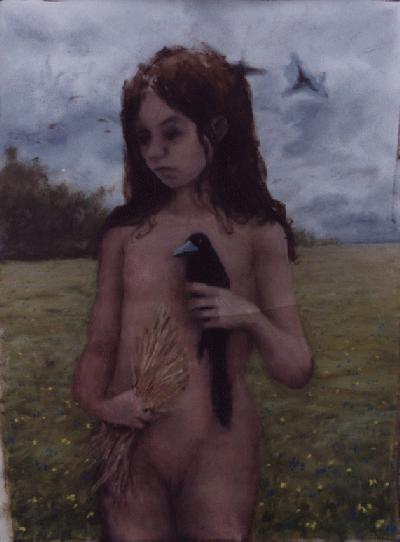
This poem is attributed to Poe, however it does not appear in the list given by The Edgar Allan Poe Society of Baltimore, so a doubt remains about its authorship. According to the Classic Literature Library, it was written or published around October 26, 1831. This site includes it in the category “Edgar Allan Poe Doubtful Poems.”
It tells about an encounter with a maid, raising the bright hope of love, followed quicky by disappointment. It is organized in twelve stanzas of six verses each, the last six stanzas echo in a negative way the first six ones:
gentle, silent maiden, walked in beauty at my side … all in beauty, like a bride (1st)
silent, scornful maiden, walking calmly at my side, … all in beauty, all in pride (7th)
we wandered from the open cottage door, (3rd)
we parted, by the lowly cottage door; (9th)
radiant hopes … night’s irradiate queen (4th)
sudden anguish … night’s first dream (10th)
the elm-leaves whispered peaceful, pleasant melodies, (5th)
the elm-leaves whisper mad, discordant melodies, (11th)
Would the heart have kept unspoken love that was its rarest dream! (6th)
Strive, O heart, forget thine idol! And, O soul, forget thy dreams! (12th)
Note also the repeated mention of trees and their leaves, which seem to participate by their songs and whispers to the unfolding drama.
The Village Street
attributed to Edgar Allan Poe
In these rapid, restless shadows,
Once I walked at eventide,
When a gentle, silent maiden,
Walked in beauty at my side.
She alone there walked beside me
All in beauty, like a bride.
Pallidly the moon was shining
On the dewy meadows nigh;
On the silvery, silent rivers,
On the mountains far and high,—
On the ocean’s star-lit waters,
Where the winds a-weary die.
Slowly, silently we wandered
From the open cottage door,
Underneath the elm’s long branches
To the pavement bending o’er;
Underneath the mossy willow
And the dying sycamore.
With the myriad stars in beauty
All bedight, the heavens were seen,
Radiant hopes were bright around me,
Like the light of stars serene;
Like the mellow midnight splendor
Of the Night’s irradiate queen.
Audibly the elm-leaves whispered
Peaceful, pleasant melodies,
Like the distant murmured music
Of unquiet, lovely seas;
While the winds were hushed in slumber
In the fragrant flowers and trees.
Wondrous and unwonted beauty
Still adorning all did seem,
While I told my love in fables
‘Neath the willows by the stream;
Would the heart have kept unspoken
Love that was its rarest dream!
Instantly away we wandered
In the shadowy twilight tide,
She, the silent, scornful maiden,
Walking calmly at my side,
With a step serene and stately,
All in beauty, all in pride.
Vacantly I walked beside her.
On the earth mine eyes were cast;
Swift and keen there came unto me
Bitter memories of the past—
On me, like the rain in Autumn
On the dead leaves, cold and fast.
Underneath the elms we parted,
By the lowly cottage door;
One brief word alone was uttered—
Never on our lips before;
And away I walked forlornly,
Broken-hearted evermore.
Slowly, silently I loitered,
Homeward, in the night, alone;
Sudden anguish bound my spirit,
That my youth had never known;
Wild unrest, like that which cometh
When the Night’s first dream hath flown.
Now, to me the elm-leaves whisper
Mad, discordant melodies,
And keen melodies like shadows
Haunt the moaning willow trees,
And the sycamores with laughter
Mock me in the nightly breeze.
Sad and pale the Autumn moonlight
Through the sighing foliage streams;
And each morning, midnight shadow,
Shadow of my sorrow seems;
Strive, O heart, forget thine idol!
And, O soul, forget thy dreams!
Source of the poem: E.A. Poe, The Works of Edgar Allan Poe, The Raven Edition, Volume 5. New York: P. F. Collier and Son (1903). The text follows the online version by Classic Literature Library, with the indentation following the versions given by Poets.org and Lit2Go, Educational Technology Clearinghouse, University of South Florida (the latter two have a misprint, “Ritter” instead of “Bitter”).
Previously published on Agapeta, 2017/08/17.


The date of 1831 has me thinking of Poe’s older brother, William Henry Leonard Poe, also a writer of tales and poems. The verse, meter, tone, theme (of a wanderer, and of unrequited or lost love), and repetitive lines are similar to the few poems he had written and published. These poetical elements were shared among the two brothers, and each are a reflection upon the other’s style and method of construct. “Henry” Poe’s early demise, at age twenty-four, like their mother, and possibly from consumption (tuberculosis) as well, occurred on August 1, 1831. (By a strange coincidence, Edgar’s wife Virginia would succumb to the same disease–at the age of twenty-four–on January 30, 1847. January 30th was also the birthday of Edgar’s Late brother.) Where and when this hauntingly beautiful poem was first published provides a tantalizing mystery, if not clue; had it been submitted posthumously by Edgar, or some friend or other family member, and mistakenly attributed to him? Conversely, and if memory serves, there were a few poems written by Edgar which were published under the elder Poe brother’s initials, “W. H. L.”, whether by mistake or design (Edgar, in hiding, from debt collectors, using his brother’s clout with certain publications).